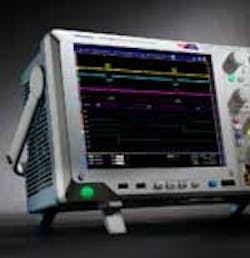Mixed-Signal Scopes Take On Design Complexity
Tektronix MSO/DPO5000 series
As complex as today’s systems are, they are growing yet more complicated. It’s not uncommon to find, say, an I2C bus in a digital thermometer. Any given design will have multiple functional blocks, MCU(s), FPGA(s), ADCs, DACs, codecs, memory, and a power supply. According to some recent market research conducted by Tektronix, 36% of design engineers are now working with USB 2.0, and 23% are working with Ethernet.
With this sort of complexity, designers must troubleshoot at the system level; USB 2.0 and Ethernet are system-to-system buses. Troubleshooting today requires the monitoring of many different kinds of signals: analog and digital, RF and baseband, and ac and dc, as well as bus traffic. It also demands scrutiny of many parameters, including time and frequency, jitter, power profiles, protocol compliance, modulation characteristics, noise sources, and more. There must be correlation across multiple channels of different signal types as well.
A powerful tool that addresses these needs can be found in the Tektronix MSO/DPO5000 series mixed-signal oscilloscopes, which are built to address all stages of design validation and debug from initial power-up through manufacturing. Starting at $11,400, these scopes sport up to 16 digital and four analog channels and come in models from 350 MHz to 2 GHz (see the figure).
The scope’s FastAcq acquisition mode provides a maximum waveform capture rate of 250,000 waveforms/s. These waveforms are presented on a color-graded display that can be set to show temperature, spectral, or monochrome gradients. In this way, the display shows the frequency of event occurrences for better characterization of failures. The intensity grading is preserved when acquisitions are halted for further analysis.
A high capture rate is critical when you don’t quite know what you’re looking for, but once you do, the next important feature is a comprehensive set of triggers. The DPO/MSO scopes offer more than 350 trigger combinations, including runt, glitch, width, timeout, transition, logic, setup/hold, video, and serial and parallel bus. With these triggers, users can capture signal or system anomalies quickly.
Another important feature is the scopes’ ability to capture long usable records. A record length of 12.5 Msamples/channel is standard, with up to 250-Msample record lengths optionally. This feature enables you to find new anomalies in captures of spread-spectrum clocking or power-supply modulation turn-on events, for example.
The scopes are endowed with Tek’s MagniVu high-speed digital acquisition capability, which provides resolutions down to 60.6 ps for acquiring fine signal details for up to 10 kpoints around the trigger. This enables users to pinpoint issues such as glitches or to better characterize timing events such as setup or hold times or timing correlation between digital channels.
When it comes to searching scope records, the Wave Inspector automated search feature allows you to define up to eight searches simultaneously on multiple channels. After you’ve defined your search criteria, the Wave Inspector feature marks every matching instance in the record. It’s a simple matter of using arrow buttons to jump from event to event.
As with most modern scopes, the MSO/DPO5000 series scopes offer a full roster of built-in waveform analysis tools. There are 53 automated measurements including all of those that engineers would use in their daily tasks. The scopes also borrow advanced waveform math functions from Tek’s high-end scopes, such as magnitude and phase fast-Fourier transforms, arbitrary equation math, integrate/differentiate, and user-defined filters. Advanced analysis tools are also built in with a one-touch jitter wizard and more.
A new feature that comes with the scopes is Tek’s low-capacitance passive voltage probing. This comes in the form of 500-MHz and 1-GHz probes that sport capacitive loading of just 3.9 pF. Four probes are included with each instrument.
Pricing for the MSO/DPO5000 series scopes starts at $11,400 and tops out at $27,400. They are available now.

